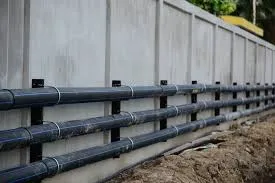Nov . 01, 2024 09:54 Back to list
HDPE Gas Pipe Applications and Benefits for Efficient Energy Distribution Systems
The Advantages of HDPE Gas Pipes
High-Density Polyethylene (HDPE) gas pipes have become a popular choice in the gas distribution industry due to their numerous benefits over traditional materials. These pipes, made from thermoplastic polymer, exhibit exceptional properties that make them suitable for transporting natural gas and other gaseous substances. In this article, we'll explore the reasons why HDPE gas pipes are increasingly favored for gas infrastructure projects.
The Advantages of HDPE Gas Pipes
Another significant benefit of HDPE gas pipes is their flexibility. This flexibility allows for easier installation, especially in challenging terrains. Unlike rigid piping materials, HDPE can withstand bending and deformation, making it easier to navigate around obstacles and fit into tight spaces. This adaptability also means that fewer joints are required during installation, which reduces the risk of leaks and enhances the system's overall integrity.
hdpe gas pipe

HDPE pipes are also lightweight, making them easier to transport and install compared to heavier materials such as steel or cast iron. The reduced weight can lead to lower installation costs and shorter project timelines. Additionally, the installation process can be facilitated by specialized techniques such as fusion welding, which creates strong, seamless connections between pipe segments, further improving the strength and longevity of the pipeline.
Environmental considerations are increasingly important in today’s world, and HDPE gas pipes stand out in this regard. They are made from recyclable materials and have a much lower environmental impact during manufacturing compared to traditional materials. Furthermore, the long lifespan of HDPE pipes means less frequent replacement, contributing to sustainability efforts in infrastructure development.
Lastly, HDPE gas pipes provide excellent resistance to extreme temperatures, both hot and cold. This feature ensures that the integrity of the gas supply is maintained under various environmental conditions. This adaptability to temperature variations adds to their reliability, particularly in regions with fluctuating climates.
In conclusion, HDPE gas pipes offer a range of benefits, including corrosion resistance, flexibility, lightweight characteristics, environmental friendliness, and temperature resilience. As the demand for efficient and sustainable gas distribution systems grows, the use of HDPE in this sector is likely to continue expanding. For gas utilities and infrastructure developers, investing in HDPE technology is not just a trend but a strategic move for a safer, more efficient future.
-
High-Quality PVC-M Water Supply Pipe for Reliable Plumbing Solutions
NewsJul.22,2025
-
High-Quality PVC Transparent Pipe with Clear Visibility & Durability
NewsJul.22,2025
-
Premium Wireless Headphones: Noise Cancelling & Long Battery | Order Now
NewsJul.21,2025
-
High-Quality PPR Pipes and Fittings Durable ERA PPR & PVC PPR Solutions
NewsJul.08,2025
-
Black HDPE Cutting Board - Durable, Non-Porous & Food Safe HDPE Plastic Cutting Board
NewsJul.08,2025
-
High-Quality CPVC Panel Durable HDPE & PVC Panels Supplier
NewsJul.08,2025

